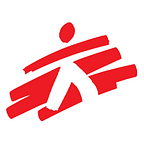The Straw That Breaks the Camel’s Back — My life with HIV and COVID-19
Charles Omondi Sako, HIV Testing Service Counsellor
I have been living in Kibera* in Nairobi, Kenya for 19 years now.
I was found to be HIV positive in 2003, when this diagnosis was like having a death sentence. But I was able to get antiretroviral (ARV) treatment with MSF and now have my own family — my wife, who is also HIV positive, and six daughters.
We live in a single room and have to turn the table upside down to allow space for the children to sleep at night. Life has been going well and we are a happy family, living without fear because of the medicines that give us hope and a life, while we observe good adherence to our ARVs and earn what we can so we can afford to put food on the table.
It was 13th of March when the first case of COVID-19 was reported in Kenya that made everything change in my life and the family, and the Kibera community at large.
Until then I had just been reading in the newspapers and wondering how devastating this pandemic was in China, Italy and other western countries.
Living in an informal settlement, I felt that this time around, once the virus got hold, we would all soon be going to die.
Owing to the fact that it kills old people fast, I knew I was living now with a tight rope around my neck, and the fact that I have a compromised immunity, and also my wife, my thoughts ran back to the HIV stigma and the hopelessness we all felt in the early ’90s in the face of the HIV virus.
Fear has spread everywhere, with all the schools and colleges closing, and all the children are still home to date.
The fear is aggravated for those of us living with HIV as the supply of drugs has become a matter of great concern. Patients have been called to come and get more drugs because of the fear of lockdown. Owing to the challenges of some drugs being out of stock, our fear and worries have escalated.
On the day the curfew was announced — no movement between 6:59 PM and 5:00 AM — cases of COVID-19 had escalated quite tremendously.
This has affected all of the Kibera fraternity. Nobody can go to work because most sectors have closed down, owing to the fact that most residents here are labourers. They’ve lost their source of income. Those who sell even vegetables at later hours have been affected because they cannot carry on their businesses after 7 PM. I myself had a big setback because I could not continue with a contract which I was given to offer an HIV testing service in one of the health centres. Things are now difficult.
As the cases of COVID-19 have increased, the head of state announced a total lockdown of Nairobi. This was also done for other counties like Mombasa. This seemed to be more horrible because going back to my homeland is now still uncertain. This means that even if my mum or sister or brother dies, in our rural home, I wouldn’t be able to go and pay my last respects to the deceased.
By comparison with HIV where we do now have medicines and tests, this new virus now seems to be the last straw which broke the camel’s back. COVID-19 has no cure, no vaccine and nobody knows when it will be contained.
Our fears have increased since the 3rd of May, when six people were diagnosed with COVID-19 in Kibera alone. More have been reported in nearby Kawangware. The few health facilities are ill-equipped. The people suspected to have COVID-19 symptoms are taken for quarantine in Mbagathi district hospital and those diagnosed with the disease are also put in isolation at the same hospital.
Around us, the self-care messages are not adhered to, like social distancing, wearing of face masks, or continuous washing of hands using soap. People have to choose between buying these items or buying food. This gives priority to the latter. Even the law enforcers have not been well equipped. They need health education, too. There is no free mask distribution, hence most children mingle without masks and it makes us wonder about the future.
In totality, my family is in constant mental anxiety and always worried even about a small cough as a sign of COVID-19. I remember when I was a bit unwell, my child asked my wife, “Mother, has father contracted COVID-19?” It took us time to explain to them that was not the case.
Parents are worried for their children and more worrying is that gender-based violence has also increased.
As if there is no light at the end of the tunnel, people living with HIV, me included, worry so much about the following:
1. Will there be an assurance of the supply of antiretroviral treatment for those who are HIV positive?
2. Will this epidemic push up the prices on medicines which others, mostly slum dwellers, can’t afford?
3. Will there be a treatment for COVID-19?
4. Will the cost of COVID-19 treatment be manageable?
5. Falling into the category of most vulnerable age-wise, will we really survive this pandemic?
And all I say and hope is that no matter the intensity of the storm, it will, one time, calm down.
- Kibera is one of the largest informal settlements of its kind in the world and many of Nairobi’s most vulnerable people live there. Since last month, an MSF team has been back in Kibera, organising screening for COVID-19 at our former clinic. Our team members are also providing training and support for infection prevention and control measures. Read more about our activities in Kibera https://bit.ly/37gjqsN
